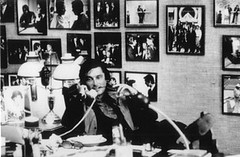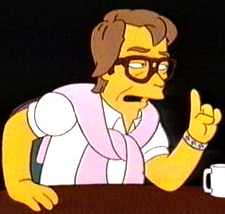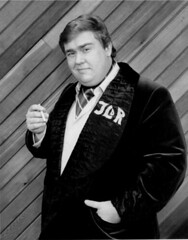A particularly annoying piece of music has been running through my head for a few days, which has led me to the eternal question plaguing every author: how does Robert Evans relate to my writing?
The song in question, "Get High on Yourself," was part of a 1980 NBC television special to battle adolescent drug use. The show was highlighted by a giant group song a la "We Are the World:"
The glow can come at any time
Keep that space open for love to come inside
And you’ll be living when you do
Just keep the clouds from your own sky
And you’ll come shining through
Get high on yourself
Get high on yourself
’Cause we’re all here to help
You get high on yourself
Getting high on himself
Ignoring the great masturbatory possibilities here, you may see why this song did not keep Our Nation's Youth from Just Saying Yes. Picture a chorus of people that included Bob Hope — a man most teenagers of that era would not trust with advice about buying gum, much less drugs — and you get the idea. If there was a anti-drug message that made kids want to do drugs, this was it.
The man behind this debacle was above-mentioned Robert Evans. Evans, a legendary Hollywood producer ("Chinatown," "Rosemary's Baby," "The Godfather"), had been busted for possession of about 1,421 kilos of cocaine, and instead of going to the Big House, was sentenced to community service. "Get High on Yourself" was his community service.
In "The Kid Stays in the Picture," a hilarious and fascinating film about Evans's career, the man gives a television interview saying (and I recall from memory here), "This is what I want to be remembered for. 'Get High on Yourself' is the most important thing I've done."
He also called his TV special "the Woodstock of the 80s." You can smell the bullshit steaming from the screen.
"Get high on yourself, Get high on yourself!"
Evans is a great raconteur, but about as trustworthy as, well, Robert Evans. When he declares "Get High on Yourself" as the high mark of his career (not "The Godfather," not "Chinatown") he probably set a new low for insincerity in a town where slimy obsequiousness is the norm.
My usual reaction to such drek like "Get High on Yourself" is snotty laughter, but it is making me uncomfortable, to the point where I can't dismiss it with a wave of the hand or lame joke. Evans' insincerity is akin to my own fiction.
For instance, let's take the blogospere. It is littered with blogs that are both literary and personal in nature, and what strikes me is how honest and sincere many of them are. Some strike a perfect balance between the heart and mind, while others are so heartfelt, so beyond brutal honesty that they strike one as being the head doctor's notes from the psych ward.
The kid stays in the picture
In a circumspect way, this is the same chemical reaction that I have when I think of "Get High on Yourself:" the song has the great allure of allowing one to enjoy it by acting superior; the irony is overwhelming.
And I, sadly, seem to be constitutionally incapable of writing fiction that isn't consciously humorous or that holds emotions close to the vest.
My fiction has always leaned towards wacky, clever, and peripatetic. I try to be sincere in my intentions, but I can't seem to help leavening drama with humor and scenes with Heavy Thoughts.
There are plenty of writers who have made a good living doing this, many of a 60s origin: Thomas Pynchon is Exhibit A, but there's also John Barth and William Gaddis, and, by his own admission, Tom Stoppard. (Also Richard Powers and William T. Vollman.)
On the other extreme, there also books (not necessarily authors) that revel in their seriousness of purpose to the point of pain: "Beloved" comes to mind (I couldn't finish it) or "The Mayor of Casterbridge" (a book I actually liked but is overwhelming it its bleakness).
The novels that balance the two extremes are perfect: "One Hundred Years of Solitude," "Invisible Man," and "Midnight's Children," for instance. (For you 19th Century aficionados, see "Jane Eyre," "Wuthering Heights," and "Great Expectations.")
Over the years, I've learned to address sincerity in my work. It ain't easy. For that means giving characters hearts to go along with their brains, and, as we all know, hearts are fragile vessels that swell with love and are meant to be broken.
And so I try to create characters that feel pain, cry, throw dishes at their spouses, do incredibly crappy things to each other or commit unspeakably selfless acts. But as fast as you can say, "Well, yeah, you're talking about the human condition, bud," I cringe and withdraw to my literary hole in the ground.
This is no indictment of any writer or his or her way of writing. It is, though, a painful reminder of my own limitations. The listing of which is why anyone reads this blog.
Thursday, March 09, 2006
Get High on Yourself — And I Mean That Sincerely
Subscribe to:
Comment Feed (RSS)


|